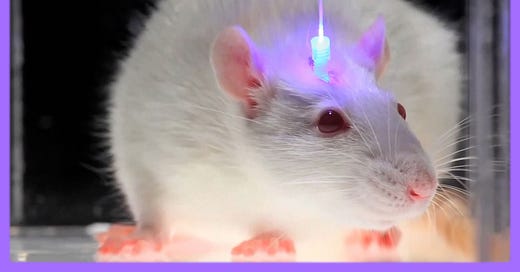A peer reviewed study published last Friday documented 55 undeclared chemical elements which have been detected in the Covid gene therapy technology from brands Pfizer, Moderna, AstraZeneca, CanSino, Sinopharm and Sputnik V.
Including several toxic elements such as Aluminum, Titanium, Arsenic, Lead, and Uranium.
The researchers have deduced that the Covid gene therapy technology injections are part of a secret worldwide nanotechnological experimentation program.
These crimes against humanity have still gone unanswered. And we do not know what the intended outcome of it all was. So at his point, we can only guess.
Optogenetics was selected as Method of the Year in 2010 by Nature Video.
“Scientists can switch on cells in this mouse's brain simply by switching on a light. The light activates nerve cells, which makes the animal walk in circles. This neat trick is also a powerful new tool. Using light to control the behavior of cells is teaching us about everything from how we wake up to how we learn. This is Optogenetics. It's the ability to target specific neurons in living, moving animals. That makes this technique so powerful.
In this fly, a different light sensitive system is used to target just two out of 200,000 neurons. These neurons govern an escape response, the reflex that makes the fly flee as you move into swat it. Here, a flash of light activates the neurons, making the fly jump and spread its wings. It can't take off because it's trapped in a petri dish.
These mouse heart cells have been engineered to beat in time to pulses of light.”
~ Nature Video
“In Optogenetics what we're doing, is we’re putting molecules that convert light into electricity, into neurons, the cells of the brain. Then we shine a light on those neurons, light gets converted into electricity and allows us to turn on or off those cells.
The goal here is to find a way to control the electrical activity in some cells, and not others in the network. To do that, we had to turn to the natural world.
It turns out that throughout all the kingdoms of life, in plants, in fungus and bacteria and so on, you can find photosynthetic or photo sensory molecules that convert light into electricity. So we borrowed these molecules from nature. And then using tricks from the field of gene therapy, we can put them in neurons. Now these molecules can convert light to electricity. And they do it just in the neurons that we want to control, and not all their neighbors. So we can deliver these molecules to some cells and not others. And when we shine light on the network, we can turn on or off that subset of the cells.
If we can turn on and off a set of cells that's embedded within this dense matrix, we can figure out how do they contribute to a behavior.
For example, if we can turn on a set of cells, we can figure out what kinds of behaviors can it initiate. If we can turn off a set of cells, then we can delete it momentarily, and figure out what is necessary for it.
So far, Optogenetics has had a lot of impact in the scientific world, but it hasn't been used in any human patients yet. There are a couple reasons why. One is that it requires a gene therapy to deliver the gene that encodes these light activated molecules into the body. Currently in the US, there are no FDA approved gene therapies.”
~ Edward Boyden (Massachusetts Institute of Technology)That was the problem ten years ago, but the COVID-19 plandemic gave these mad scientists an excuse to inject billions of humans with a mysterious cocktail of nanotech. And researchers at La Quinta Columna have pointed out the possible relationship between the injections, and the invisible light which is constantly flashing from our mobile phones.
We are told that this is for facial recognition, but how can we trust the official narrative when it’s coming from transhumanist mass murderers?












Share this post